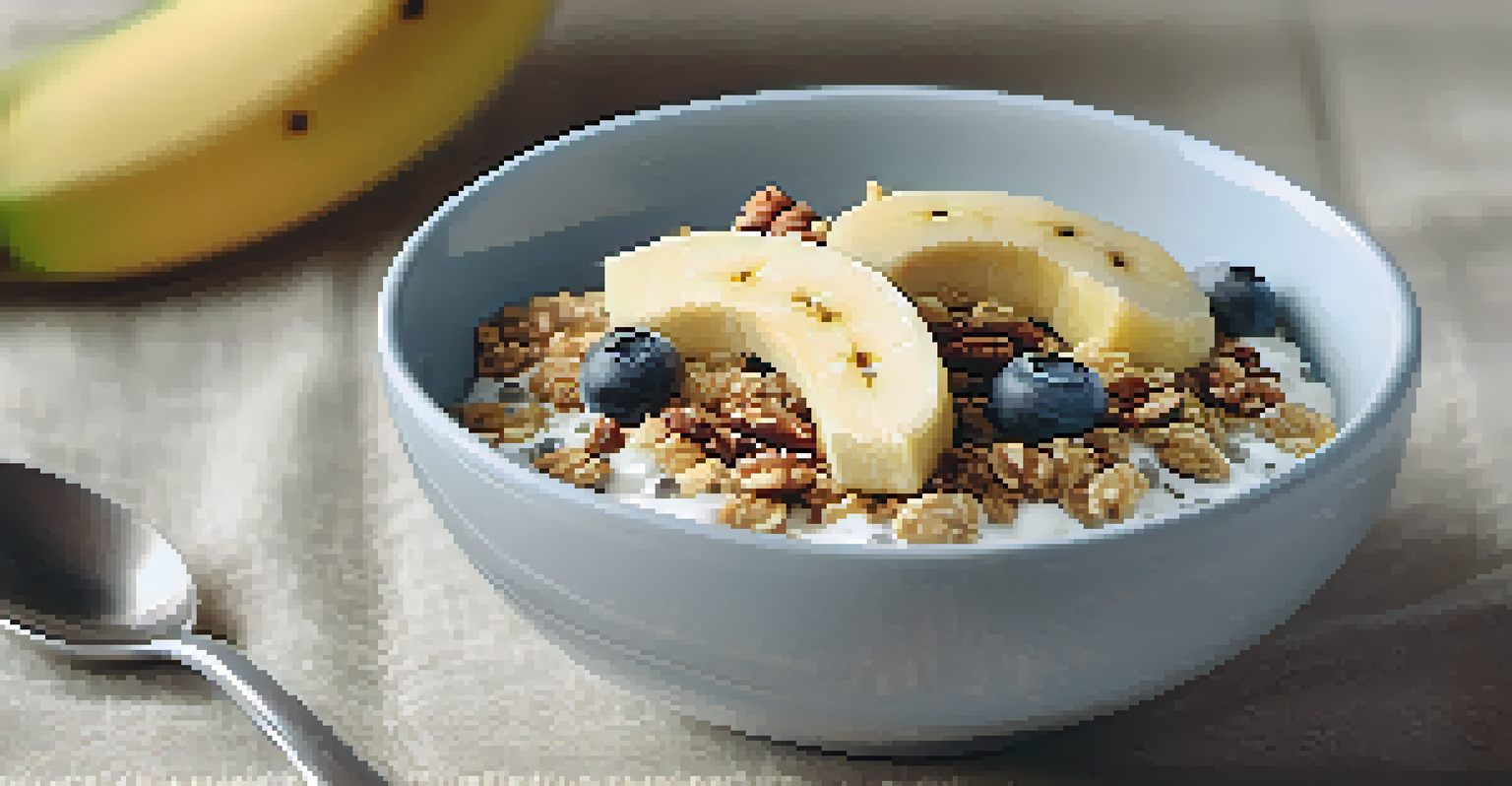Men’s Nutritional Needs: Essential Diet for Optimal Health

Understanding Men's Unique Nutritional Requirements
Men's nutritional needs can differ significantly from women's, influenced by factors like age, activity level, and overall health. This makes it crucial for men to understand their specific requirements to maintain optimal health. For instance, men generally require more calories and protein, particularly if they lead an active lifestyle or engage in strength training.
Let food be thy medicine and medicine be thy food.
Furthermore, men are often at a higher risk for certain health issues, such as heart disease and metabolic syndrome. This reality emphasizes the importance of focusing on nutrient-dense foods that support heart health and overall well-being. By tailoring their diets to meet these unique needs, men can lay the foundation for a healthier future.
Incorporating a variety of food groups not only helps meet these requirements but also enhances overall health. A balanced diet rich in fruits, vegetables, whole grains, lean proteins, and healthy fats is essential for every man. Understanding these foundational elements can make a significant difference in achieving optimal nutrition.
The Role of Protein in Men's Diets
Protein is a vital macronutrient that plays a significant role in muscle repair, immune function, and hormone production. For men, who often have higher muscle mass than women, adequate protein intake is crucial. Foods like lean meats, fish, eggs, beans, and nuts can help meet these protein needs effectively.

Moreover, protein can aid in weight management by promoting satiety, which helps control hunger and prevents overeating. This is especially important for men looking to maintain or achieve a healthy weight. Incorporating protein-rich snacks, such as Greek yogurt or protein shakes, can also be beneficial for those on the go.
Men's Nutritional Needs Vary
Understanding the unique nutritional requirements of men, including higher protein and calorie needs, is essential for maintaining optimal health.
It's important to note that not all protein sources are created equal. Opting for high-quality, lean protein sources can have a profound impact on overall health. Balancing protein intake with carbohydrates and fats ensures a well-rounded diet that supports both energy levels and muscle maintenance.
Essential Vitamins and Minerals for Men
Vitamins and minerals are essential for various bodily functions and play a pivotal role in men's health. Key nutrients like vitamin D, zinc, and magnesium are particularly important, as they support everything from immune function to testosterone levels. Ensuring adequate intake of these nutrients can help men maintain optimal health as they age.
You are what you eat, so don't be fast, cheap, easy, or fake.
For instance, vitamin D is crucial for bone health and can also influence mood and energy levels. Sun exposure is a natural source of vitamin D, but many men may benefit from dietary sources like fatty fish or fortified foods. Zinc is another critical mineral, known for its role in immune function and reproductive health.
Incorporating a variety of fruits, vegetables, nuts, and whole grains can help men meet their vitamin and mineral needs. A well-rounded diet can provide these essential nutrients, but supplementation may be necessary in some cases, especially if dietary restrictions are in place.
Healthy Fats: A Key Component of Men's Nutrition
Healthy fats are often misunderstood, yet they play a crucial role in men's diets. Unlike trans fats and saturated fats, healthy fats, such as those found in avocados, olive oil, and nuts, are beneficial for heart health and overall well-being. These fats can also help improve cholesterol levels and reduce the risk of heart disease, a common concern among men.
Additionally, healthy fats are essential for hormone production and can support brain health. For example, omega-3 fatty acids, found in fatty fish like salmon and walnuts, have been linked to improved cognitive function and mood regulation. Incorporating these fats into daily meals can provide numerous health benefits.
Importance of Protein Intake
Adequate protein consumption is crucial for muscle repair and weight management, making it vital for men to include quality protein sources in their diets.
It's important for men to be mindful of their fat intake, focusing on quality rather than quantity. Swapping out unhealthy fats for healthier options in cooking and snacking can lead to significant improvements in overall health. Embracing healthy fats can help men feel more energized and satisfied throughout the day.
The Importance of Hydration for Men's Health
Staying hydrated is a fundamental aspect of health that is often overlooked. Water is essential for digestion, nutrient absorption, and temperature regulation, making it particularly important for active men. Dehydration can lead to fatigue, reduced performance, and even serious health issues, highlighting the need for adequate fluid intake.
Men should aim to drink enough water throughout the day, with recommendations typically ranging from 3.7 liters (about 13 cups) for men. However, individual needs may vary based on factors like activity level and climate. Carrying a reusable water bottle can serve as a helpful reminder to stay hydrated during busy days.
In addition to plain water, hydration can also come from fruits and vegetables, such as cucumbers and watermelon. These foods not only contribute to overall hydration but also provide essential vitamins and minerals. Being mindful of hydration can enhance not just physical health, but also mental clarity and focus.
Balancing Carbohydrates in Men's Diets
Carbohydrates often get a bad rap, but they are an essential part of a balanced diet. For men, especially those who are physically active, carbohydrates provide the energy needed for workouts and daily activities. Choosing complex carbohydrates, such as whole grains, legumes, and vegetables, can offer sustained energy and support overall health.
It's crucial to differentiate between simple and complex carbohydrates. Simple carbs, often found in sugary snacks and drinks, can lead to energy crashes, while complex carbs provide fiber, vitamins, and minerals that help maintain energy levels and digestive health. Incorporating a variety of carbohydrate sources can help men fuel their bodies effectively.
Hydration Supports Overall Health
Staying hydrated is fundamental for digestion and performance, with men needing to prioritize fluid intake, especially during physical activities.
By being mindful of carbohydrate choices and portions, men can support their energy needs without compromising their health. Balancing carbohydrates with proteins and healthy fats creates well-rounded meals that keep hunger at bay and promote overall well-being. Making informed choices can lead to a healthier relationship with food.
Creating a Sustainable Meal Plan for Men's Health
Developing a sustainable meal plan is a powerful way for men to prioritize their health. A well-structured meal plan can help simplify grocery shopping, reduce food waste, and ensure balanced nutrition throughout the week. By planning meals ahead, men can make healthier choices and avoid the temptation of fast food or processed snacks.
To create an effective meal plan, start by identifying personal preferences and dietary needs. Including a variety of foods from all food groups can ensure a well-rounded intake of nutrients. Moreover, preparing meals in advance can save time and make it easier to stick to healthy eating habits, even on busy days.

Lastly, being flexible with the meal plan can help maintain enthusiasm for healthy eating. Allowing for occasional treats or experimenting with new recipes can make the process enjoyable rather than restrictive. By embracing a sustainable meal plan, men can foster long-term healthy eating habits that support their overall health.